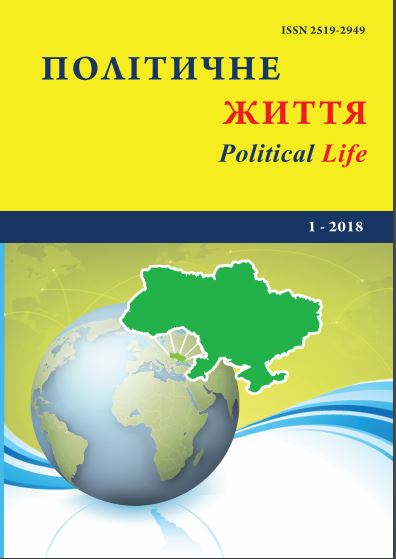Structures of e-democracy as the main factors of socio-political life agenda forming.
DOI:
https://doi.org/10.31558/2519-2949.2018.1.11Keywords:
information and communication technologies, information networks, electronic democracy, e-government, «open source», individualization of politics and society, manipulation of public opinionAbstract
It is shown that modern information and communication technologies are a decisive factor in the formation of the «agenda» of socio-political life and are a direct means of organizing direct social actions, in particular – new models of management. Electronic democracy is often seen as an «open source» option when bills are published in information networks, and users can make any changes to their content and thus take direct part in making policy decisions.
However, along with the optimistic forecasts of the use of information technologies, anxiety that is associated with increased opportunities for manipulating public opinion, strengthening with their help of the power hierarchy, and the realization of selfish interests of media owners increases. There were also doubts about the increase in political activity of citizens due to information technologies in connection with the growth of absenteeism and an increase in the number of protest electorates.
Individualization of politics and society can make practically impossible and even dangerous attempts to achieve integration and consensus. Political control and electronic accessibility are mutually exclusive in the existing political system. The use of Internet by citizens as a tool for obtaining information, communication and organization can lead to a departure from the main political policy of the state. Thus, modern political space has fully realized the enormous advantages that accompany the development and spread of information and communication technologies, but, of course, also negative manifestations, and therefore these relatively new trends can not be considered as a panacea for all the problems of creating a world order at the end of the ХХ – in the first decades of the ХХI century.
References
Кастельс М. Информационная эпоха: экономика, общество и культура / М. Кастельс; Пер. с англ., под науч. ред. О. И. Шкаратана. – М.: ГУВШ, 2000.
Агамирзян И. Р. Мировой опыт реализации концепции электронного правительства // Технологии информационного общества – Интернет и современное общество / И. Р. Агамирзян. – СПб.: Изд-во С.-Петерб. ун-та, 2002. – С. 255-258.
Тоффлер Э. Метаморфозы власти: Знание, богатство и сила на пороге ХХI века / Э. Тоффлер. – М.: ACT, 2001. – 669 с.
Даль Р. Демократия и ее критики / Р. Даль; Пер. с англ. – М.: РОССПЭН, 2003. – 576 с.
Робачевский А. Инфраструктура Интернет в США / А. Робачевский // INTERNET Journal. – 2006. – № 3. – С. 12–14.
Хабермас Ю. Демократия. Разум. Нравственность: Лекции и интервью / Ю. Хабермас. Москва, апрель 1989 г. – M., 1989. – С. 14-18.
Дослідження політики в системі Інтернет / Чернівецький національний ун-т ім. Юрія Федьковича / [Упоряд. В. І. Бурдяк, І. С. Осадца]. – Чернівці: Рута, 2005. – 39 с.
Митко А. Демократія електронна / А. Митко // Навчальний енциклопедичний словник-довідник / за наук. ред. Н. М. Хоми. – Львів: «Новий Світ – 2000», 2014. – 779 с. – С. 133–134.

